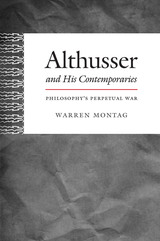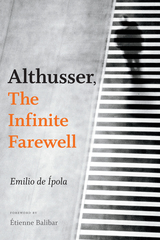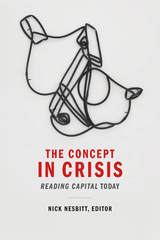7 books about 1918-1990

Althusser and Feminism
Alison Assiter
Pluto Press, 1990

Althusser and His Contemporaries
Philosophy's Perpetual War
Warren Montag
Duke University Press, 2013
Althusser and His Contemporaries alters and expands understanding of Louis Althusser and French philosophy of the 1960s and 1970s. Thousands of pages of previously unpublished work from different periods of Althusser's career have been made available in French since his death in 1990. Based on meticulous study of the philosopher's posthumous publications, as well as his unpublished manuscripts, lecture notes, letters, and marginalia, Warren Montag provides a thoroughgoing reevaluation of Althusser's philosophical project. Montag shows that the theorist was intensely engaged with the work of his contemporaries, particularly Foucault, Derrida, Deleuze, and Lacan. Examining Althusser's philosophy as a series of encounters with his peers' thought, Montag contends that Althusser's major philosophical confrontations revolved around three themes: structure, subject, and beginnings and endings. Reading Althusser reading his contemporaries, Montag sheds new light on structuralism, poststructuralism, and the extraordinary moment of French thought in the 1960s and 1970s.
[more]

Althusser, The Infinite Farewell
Emilio de Ipola
Duke University Press, 2018
In Althusser, The Infinite Farewell—originally published in Spanish and appearing here in English for the first time—Emilio de Ípola contends that Althusser’s oeuvre is divided between two fundamentally different and at times contradictory projects. The first is the familiar Althusser, that of For Marx and Reading Capital. Symptomatically reading these canonical texts alongside Althusser’s lesser-known writings, de Ípola reveals a second, subterranean current of thought that flows throughout Althusser’s classic formulations and which only gains explicit expression in his later works. This subterranean current leads Althusser to move toward an aleatory materialism, or a materialism of the encounter. By explicating this key aspect of Althusser’s theoretical practice, de Ípola revitalizes classic debates concerning major theoretico-political topics, including the relationship between Marxism, structuralism, and psychoanalysis; the difference between ideology, philosophy, and science; and the role of contingency and subjectivity in political encounters and social transformation. In so doing, he underscores Althusser’s continuing importance to political theory and Marxist and post-Marxist thought.
[more]

The Concept in Crisis
Reading Capital Today
Nick Nesbitt, editor
Duke University Press, 2017
The publication of Reading Capital—by Louis Althusser, Étienne Balibar, Roger Establet, Pierre Macherey, and Jacques Rancière—in 1965 marked a key intervention in Marxist philosophy and critical theory, bringing forth a stunning array of concepts that continue to inspire philosophical reflection of the highest magnitude. The Concept in Crisis reconsiders the volume’s reading of Marx and renews its call for a critique of capitalism and culture for the twenty-first century. The contributors—who include Alain Badiou, Étienne Balibar, and Fernanda Navarro—interrogate Althusser's contributions in particular within the context of what is surely the most famous collective reading of Marx ever undertaken. Among other topics, they offer a symptomatic critique of Althusser; consider his writing as a materialist production of knowledge; analyze the volume’s conceptualization of value and crisis; examine how leftist Latin American leaders like Che Guevara and Subcomandante Marcos engaged with Althusser and Reading Capital; and draw out the volume's implications and use for feminist theory and praxis. Retrieving the inspiration that drove Althusser's reinterpretation of Marx, The Concept in Crisis explains why Reading Capital's revolutionary inflection retains its critical appeal, prompting readers to reconsider Marx's relevance in an era of neoliberal capitalism.
Contributors. Emily Apter, Alain Badiou, Étienne Balibar, Bruno Bosteels, Adrian Johnston, Warren Montag, Fernanda Navarro, Nick Nesbitt, Knox Peden, Nina Power, Robert J. C. Young
Contributors. Emily Apter, Alain Badiou, Étienne Balibar, Bruno Bosteels, Adrian Johnston, Warren Montag, Fernanda Navarro, Nick Nesbitt, Knox Peden, Nina Power, Robert J. C. Young
[more]

A Future for Marxism?
Althusser, the Analytical Turn and the Revival of Socialist Theory
Andrew Levine
Pluto Press, 2003
Not long ago, Marxist philosophy flourished. Yet in recent years theorists have turned away from Marxism. This book aims to revive Marxist theory, and show how it offers a rich foundation for radical socialist thinking in the forseeable future.
To do this, Andrew Levine examines two recent departures in Marxist thought -- Althusserian and Analytical Marxism. The former is currently defunct; the latter, very nearly so. He assesses the shortcomings of each, while emphasising their considerable, and still timely, merits. The discussion is framed against an analysis of socialism's place in the political life of the past two centuries. Levine assesses the apparent historical defeat of the Left generally since the consolidation of the Reagan-Thatcher era and speculates on current signs of renewal.
He argues that both Althusserian and analytical Marxism represent new and deeply important philosophical departures within the Marxist tradition as they force a rethinking of Marxism's scientific and political project. For all their differences in style and substance, these strains of Marxist thought share important thematic and sociological features and Levine concludes that both traditions provide a legacy upon which a revived Left can build.
To do this, Andrew Levine examines two recent departures in Marxist thought -- Althusserian and Analytical Marxism. The former is currently defunct; the latter, very nearly so. He assesses the shortcomings of each, while emphasising their considerable, and still timely, merits. The discussion is framed against an analysis of socialism's place in the political life of the past two centuries. Levine assesses the apparent historical defeat of the Left generally since the consolidation of the Reagan-Thatcher era and speculates on current signs of renewal.
He argues that both Althusserian and analytical Marxism represent new and deeply important philosophical departures within the Marxist tradition as they force a rethinking of Marxism's scientific and political project. For all their differences in style and substance, these strains of Marxist thought share important thematic and sociological features and Levine concludes that both traditions provide a legacy upon which a revived Left can build.
[more]

Leonard Bernstein and the Language of Jazz
Katherine Baber
University of Illinois Press, 2019
Leonard Bernstein's gifts for drama and connecting with popular audiences made him a central figure in twentieth century American music. Though a Bernstein work might reference anything from modernism to cartoon ditties, jazz permeated every part of his musical identity as a performer, educator, and intellectual. Katherine Baber investigates how jazz in its many styles served Bernstein as a flexible, indeed protean, musical idea. As she shows, Bernstein used jazz to signify American identity with all its tensions and contradictions and to articulate community and conflict, irony and parody, and timely issues of race and gender. Baber provides a thoughtful look at how Bernstein's use of jazz grew out of his belief in the primacy of tonality, music's value as a unique form of human communication, and the formation of national identity in music. She also offers in-depth analyses of On the Town, West Side Story, 1600 Pennsylvania Avenue, and other works to explore fascinating links between Bernstein's art and issues like eclecticism, music's relationship to social engagement, black-Jewish relations, and his own musical identity.
[more]

A Place for Us
“West Side Story” and New York
Julia L. Foulkes
University of Chicago Press, 2016
From its Broadway debut to the Oscar-winning film to countless amateur productions, West Side Story is nothing less than an American touchstone—an updating of Shakespeare vividly realized in a rapidly changing postwar New York.
That vision of postwar New York is at the heart of Julia L. Foulkes’s A Place for Us. A lifelong fan of the show, Foulkes became interested in its history when she made an unexpected discovery: scenes for the iconic film version were shot on the demolition site destined to become part of the Lincoln Center redevelopment area—a crowning jewel of postwar urban renewal. Foulkes interweaves the story of the creation of the musical and film with the remaking of the Upper West Side and the larger tale of New York’s postwar aspirations. Making unprecedented use of director and choreographer Jerome Robbins’s revelatory papers, she shows the crucial role played by the political commitments of Robbins and his fellow gay, Jewish collaborators, Leonard Bernstein and Arthur Laurents. Their determination to evoke life in New York as it was actually lived helped give West Side Story its unshakable sense of place even as it put forward a vision of a new, vigorous, determinedly multicultural American city.
Beautifully written and full of surprises for even the most dedicated West Side Story fan, A Place for Us is a revelatory new exploration of an American classic.
That vision of postwar New York is at the heart of Julia L. Foulkes’s A Place for Us. A lifelong fan of the show, Foulkes became interested in its history when she made an unexpected discovery: scenes for the iconic film version were shot on the demolition site destined to become part of the Lincoln Center redevelopment area—a crowning jewel of postwar urban renewal. Foulkes interweaves the story of the creation of the musical and film with the remaking of the Upper West Side and the larger tale of New York’s postwar aspirations. Making unprecedented use of director and choreographer Jerome Robbins’s revelatory papers, she shows the crucial role played by the political commitments of Robbins and his fellow gay, Jewish collaborators, Leonard Bernstein and Arthur Laurents. Their determination to evoke life in New York as it was actually lived helped give West Side Story its unshakable sense of place even as it put forward a vision of a new, vigorous, determinedly multicultural American city.
Beautifully written and full of surprises for even the most dedicated West Side Story fan, A Place for Us is a revelatory new exploration of an American classic.
[more]
READERS
Browse our collection.
PUBLISHERS
See BiblioVault's publisher services.
STUDENT SERVICES
Files for college accessibility offices.
UChicago Accessibility Resources
home | accessibility | search | about | contact us
BiblioVault ® 2001 - 2024
The University of Chicago Press









